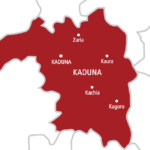
Experts have expressed optimism that the Executive Order Five signed by President Muhammadu Buhari recently will free up more jobs for Nigerians and also give them increased access to procurement opportunities.
A statement released by the Senior Special Assistant to the President on Media and Publicity, Malam Garba Shehu, disclosed that the order specifically prohibits the Ministry of Interior from giving visas to foreign workers whose skills are readily available in Nigeria.
According to Shehu, the Executive Order 5 is to improve local content in public procurement with science, engineering and technology components.
Daily Trust’s analysis of the order tagged ‘Presidential Executive Order 5 for Planning and Execution of Projects, Promotion of Nigerian Content in Contracts and Science, Engineering and Technology’, showed that the order is designed to involve more Nigerians in the execution of contracts and projects through the application of science, technology and innovations.
By this order, Ministries, Departments and Agencies (MDAs) are expected to engage indigenous professionals in the planning, design and execution of national security projects.
With the order now fully in force, all procuring authorities shall give preference to Nigerian companies and firms in the award of contracts, in line with the Public Procurement Act 2007.
Meanwhile, considering that the Industrial Training Fund (ITF) has said there are still skill gaps in some sectors of the economy, consideration shall only be given to a foreign professional, where it is certified by the appropriate authority that such expertise is not available in Nigeria.
The order further provides that where expertise is lacking, procuring entities will give preference to foreign companies and firms with a demonstrable and verifiable plan for indigenous development, prior to the award of such contracts.
An economist, Mr. Geoffrey Emeka, said the order is a step in the right direction towards tackling unemployment in Nigeria.
Mr. Emeka expressed dismay at some companies, especially in the construction sector, that bring in expatriates to take up jobs that Nigerians can do.
“Isn’t it a shame that we allow foreigners to come into this country to work as carpenters and surveyors while we have our youth doing nothing?” he asked.
Meanwhile, the Federal Government’s move to restrict foreigners from taking up works that Nigerians have the capacity to deliver may not be unconnected to the fact that about 16 million Nigerians out of the country’s total labour force of 85.08 were unemployed as at the third quarter of 2017.
A report released recently by the NBS revealed that out of the total unemployed Nigerians, 7.53 million were doing nothing while 8.46 million others were working one to 19 hours a week, a work duration considered unemployment by the National Bureau of Statistics (NBC).
The report also indicated that 18.02 million Nigerians from the labour force were underemployed, meaning that they are doing jobs not commensurate with their qualifications and skills.
An expert, who is the Chief Executive Officer of ITNigeriaHub, Mr. Fabian Aluka, said one of the biggest socio-economic problems in Nigeria is unemployment and that any move aimed at addressing it should be welcomed.
He said stiff sanctions should be meted out to MDAs and private companies that violate the order in the interest of the economy.
He said there is need for a monitoring and enforcement team for the order so that no one would flout it and go unpunished.
Nigeria recently emerged from an economic recession that led to job losses in different sectors of the economy.
However, there is a gradual reversal as indicated in the recent NBS report that as at Q4, 2017, the total number of banks staff increased by 9.19 per cent from 82,840 in Q3 2017 to 90,453.




